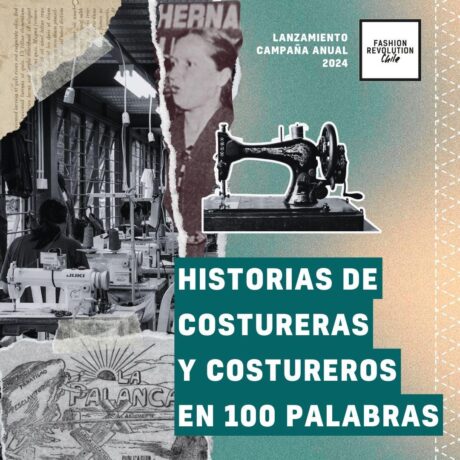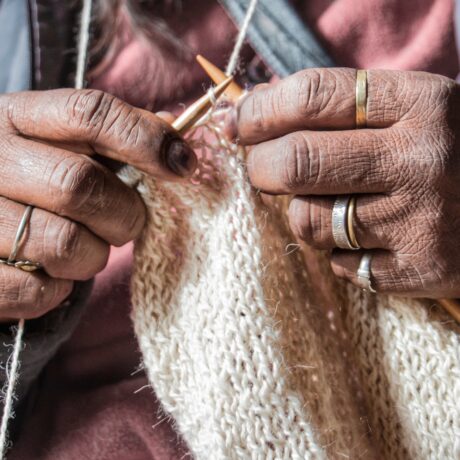This Is My Promise
My name is Arifa Sultana Anny. I am 19 years old. I have worked in the garment industry for two years and six months. A month ago I lost my job because I opened my mouth too wide.
I worked six days a week at the factory. Every day from 8am until 5pm. On most days, I worked overtime from 5pm to 10pm as well. Then I would be in the factory for 14 hours. Sometimes I also had to work on a Friday, so I did not have a day off during the week.
I got up every day at 6am, got ready and did the daily errands. I had to cook and keep the house clean. At 7.40am I went to the factory.
In the factory, it was an ordeal. There were five floors and each floor only had two toilets which were not even clean. 400-500 people were working in the factory. There was no doctor, no canteen and no prayer room. We supplied clothes to brands such as ZeroXposur (American outdoor brand) and Li and Fung (a $20 billion global sourcing firm that supplies 40% of all apparel sold in the US). I was working on the production of jackets and my job was a Checker. After the jackets had been sewn, it was my task to check for errors. If I found a mistake, I went to the person who had worked on that stage of the garment so that they could correct the mistake. For this job I got paid less than the seamstresses.
I was constantly put under pressure
If I overlooked a mistake and the line managers discovered it, they would tell me that I’m not doing my job well. If the line managers found a mistake, they made me suffer. They docked hours from my attendance record for which I was not paid, even though I had worked.
One day I heard about the National Garment Workers Federation (NGWF) and through them I learned about labour unions. So I wanted to form a labour union in my factory. To do this, you need the support of 30% of the workers.
When I raised the subject for the first time and my colleagues heard that I wanted to start a union, they initially feared threats from their manager and were afraid of losing their jobs. I worked every day. I spoke to the other workers during their lunch hour, after work and in their homes. And sometimes the workers said “no” so I explained to them again why we needed to form a labour union and often that no became a yes.
When the factory owners heard that I had joined the NGWF and wanted to start my own union, they began to put me under psychological pressure. It started with them giving me too much work and then sometimes they docked my wage.
One day I received a message to see the Quality Manager in his office who threatened to throw me out.
He said: Do you know how we will do it? We will bring clothes and cut the seams and say this is the quality that you have produced.
They said that I had to give up on the idea of a union and, if not, they would carry on with the torture and pressure. They threatened that I could no longer live in my home. They threatened to go to my landlord and tell him to throw me out.
The owners and other senior staff were not quite sure if I would really form a union. Of course, I did not confirm their suspicions. But I did not agree to stop it. I had the support of 100 workers for the union. I needed only fifty more to reach the required 30%.

The factory where I worked was called Elite Garments and the owner has a second factory called Excel.
One day the Quality Manager took me into the “Chamber” the room of the foreman and other senior managers. He told me that he would relocate me to the other factory. However, I did not want to be relocated because I had already started establishing the union within my factory. All the work would have been in vain.
It came to a point where the Quality Manager said I should beg before his feet not to be transferred. Three or four people were in the same room and enjoyed the show. Before their eyes, I went on my knees and held the feet of the manager. They all took pictures. They laughed at me, criticised me, insulted me. The work in the factory went on. No one outside the room knew what had happened. I did that for three hours. Then they let me go with a warning not to start the union. However, up until this point they still did not know one hundred percent if I would really form a union.
After this incident I knew, of course, that I was not the only one who suffered in the factory. So I could not stop. I had 100 people who supported me. I had begged on my knees to the manager so that the union could become a reality.
Why should I give up after I had come this far?
Later I got the missing 50 signatures. I had a form on which I collected the signatures of the workers which I got from the NGWF. When I had the 150 signatures, I brought the form to the NGWF and from there it went for confirmation to the Labour Office of the Government. When the Quality Manager heard about it the hostility increased. There was even more pressure. They insulted me at work. Then one day they took me by force to sign on a sheet of white paper. Then they threw me out of the factory. I was unemployed.
But the form to set up a labour union was already submitted. That is why people from the Labour Office came to the factory; they wanted to confirm the union. Of the 150 signatures, I had selected ten people for a committee. Five of the ten had already been fired and the rest were too scared to say anything. They did not speak. The government representatives asked the Quality Manager and the Production Manager what had happened to the five workers. They replied that the five had left of their own accord. And the government represenatives believed them. They knew from the NGWF that the workers had been fired, but they decided to believe the managers, and so the union was rejected. It seems the people from the Labour Office support factory owners rather than labour unions. We do not know, maybe they were bribed.
Now there is no trade union at the Elite factory because I no longer work there. This all happened a month ago. For the last month, I have received no income.
I had begun to work in the textile industry because my father was ill. When I entered 10th grade, two years before graduation, he became very ill, so it was time for me to find a job. Obviously I did not get a good job. A neighbour told me about a textile factory in the area, so I applied there and I got the job. It was ok for me. I didn’t find a better job.
When I worked, I earned 6600 Taka (75 € or £55) excluding overtime and from 1500 to 2000 (about 22 € or £16) for the overtime. I live with my parents and my three siblings. We live together in one room in Kilga, Dhaka. We cook on the gas stoves of two security guards who guard the building across the street. We share the toilet with five other families.
My three sisters go to school. Before I could pay their school fees with my salary – that was 2000 taka per month (22 € or £16). This room cost us 3,000 taka (33 € or £25) a month. My mother works as a maid and earns 3,500 taka (40€ or £29). My father can not work because he is ill. Even when I was working, the salary was not enough because I had to spend all the money on food, rent and school fees. If someone got sick, we had to take out a loan. It was never enough.

My mother is the only person who earns money now. After I lost my job, we had taken out a loan of 15000 taka (170€ or £125). In six months, I have to pay back nearly 20000 Taka (€227 or £167).
The factory owners become richer and richer, but with my salary I was not going anywhere. If I could earn 15000 taka (170€ or £125) a month for working in a garment factory, then I could live in peace and would not always be under pressure to pay bills.

I do not want to work in a factory. I’m trying to find another job but otherwise I will have to start working in a factory again. And I will still not be quiet. I must protest again. I am that kind of person. When I learned about the NGWF, I was the one who asked them questions. There are two kinds of people: those who see and accept corruption and the others who do not like it and fight it. I belong to the latter group.
I am proud to make clothes that people can wear anywhere in the world and in the West. It makes me proud that developed countries buy our clothes. I am so proud that you wear them.
At the same time, I also wonder why the Western countries do not pay us a decent wage for our work? Why don’t they support us? I want the middlemen to pay more to the factory for our clothes so the factory owners can pay more to the workers.
In Bangladesh, the textile industry is very important and with this industry we can improve the situation in our country. For this to happen, we need the help of the foreign people who buy our clothes. In return, I promise to make your clothes to the highest possible standard.
This is my promise.
You can follow Anna Holl’s travels to discover #whomademyclothes on our blog and on Twitter @hollanna Anna is reporting in Bangladesh for N21 who have a focus on textiles for the next 4 weeks. http://n21.press/schlagwort/textil/








